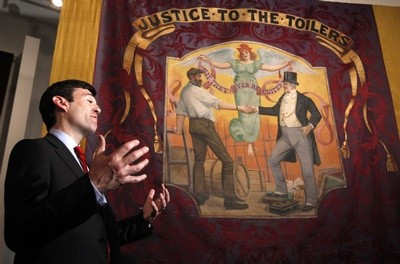Why has Labour's Andy Burnham Threatened to Sue Health Secretary Jeremy Hunt for Libel?

Labour frontbencher Andy Burnham has bemused Westminster by deploying an unprecedented response to attacks on him by Health Secretary Jeremy Hunt, telling him: "I'll see you in court".
He has fired off a solicitor's letter to Hunt demanding he withdraws a tweet claiming that, during his time as health secretary in the last Labour government, Burnham covered up failures at hospitals. And he wants an apology.
If Hunt refuses, Burnham will sue him for libel. He insists: "This, I accept, would be an extraordinary step to take. But it is necessary because of the exceptional circumstances in which I find myself."
What exactly is "exceptional" about one politician accusing another of, let's say dodgy behaviour is a bit of a head-scratcher. No one doubts Burnham is genuinely infuriated by the tweet but what has puzzled many is why he has threatened such unlikely action.
After all, if Hunt stood up in the chamber of the House of Commons and repeated the claim, even embellishing it with extravagant and untruthful detail, he would be covered by the law of parliamentary privilege, which allows him to say whatever he likes free from any legal consequences.
Such remarks could also be reported in the media and attract, more or less, the same protection.
The worst that could then happen to Hunt would be that he was forced to make a full Commons apology for "misleading the House" - a serious matter and possibly career-denting but certainly cheaper.
And does Burnham really think he will launch a libel action and see ministers and shadow ministers dragged into a courtroom to rake over their behaviour and trustworthiness?
So speculation is now rife over precisely why Burnham has taken this step. And the first suggestion is that it is all part of Labour's wider campaign to nip in the bud any attempt by the Tories and media to turn the next election race into a "smear" campaign.
Labour leader Ed Miliband has drawn one line in the sand in his battle with the Daily Mail over its headline accusing his father of being a man who "hated Britain". Burnham's move seems to be another front in the same battle.
The party still has not forgotten the treatment handed out to its former leader Neil Kinnock in the 1992 campaign, one of the most bitter and personal in recent times, and fear the 2015 campaign is shaping up to be a re-run.
The other suggestion is that, with Ed Miliband planning a shadow cabinet reshuffle, Burnham is making it impossible for him to sack or demote him. It is said he genuinely wants to stick with the health brief.
There have been rumours that Miliband was thinking of doing a job swap between him and shadow Home Secretary Yvette Cooper but, with this row rumbling on, moving Burnham would be offering the Tories a propaganda advantage.
But what about Hunt, and what is he likely to do? So far he has shown no sign he is willing to cave in to Burnham's threats. And the question must be asked: "Why would he?"
© Copyright IBTimes 2025. All rights reserved.






















